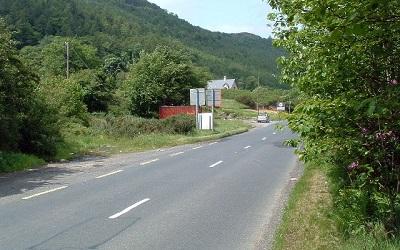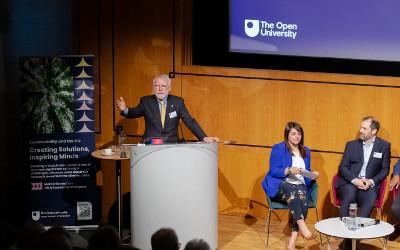You are here
- Home
- Year of Mygration
- Day 183, Year of #Mygration: What do I need to know about the Irish/UK border question?
Day 183, Year of #Mygration: What do I need to know about the Irish/UK border question?

As The Guardian reports today that the Brexit negotiations have reached an 'impasse over the failure to find an acceptable solution to avoiding a hard border on the island of Ireland after the UK leaves the EU', this week we focus on the Irish border. In today's piece, published on the OU's OpenLearn platform, Edward Burke, Assistant Professor in International Relations at the University of Nottingham and Connal Parr, a Research Fellow at Northumbria University address some of the key questions being asked.
As Brexit negotiations reach a critical juncture, the question of what to do about the border between Ireland and Northern Ireland – the only point where the UK will continue to meet the EU – has become critical. Here’s what you need to know.
What is happening in Northern Ireland that is causing so much fuss?
When the EU adopted guidelines for Brexit negotiations at the end of April 2017 it identified three issues on which “sufficient progress” would be required in phase 1 of the talks, before agreement would be reached to move to phase 2 regarding the transition period and trade agreement. These three issues, which were accepted by the UK government, are: the financial settlement, citizens’ rights and the border between the Republic of Ireland and Northern Ireland.
While significant progress has been made in relation to the first two, the Irish border issue remained unresolved. The roughly 300-mile frontier runs from Carlingford Lough in the north-east of Ireland to Lough Foyle in the north. It is estimated that more than 30,000 people cross the border every day – and Northern Ireland is particularly exposed to any raising of tariffs and imposition of structural barriers to its trade with the South because 25% of all its goods exports go south of the border.
Why can’t they just go without a border?
If the UK left the European Union but remained in the single market or the customs union, it would be possible for the border to remain unchanged. However, the current UK government has taken the position that Brexit means leaving the customs union and single market as well as the EU. The status quo is therefore untenable. Northern Ireland will have different trade regulations to Ireland and the UK’s desire to control migration would require a border.
The UK also has to honour its obligations to implement World Trade Organisation rules – that means putting in place a customs border if the UK leaves the EU Customs Union.
Why can’t they just put up a border?
The creation of a hard border would, in the minds of many people in both parts of Ireland, conjure up memories of the Troubles and severely damage and depress trade. Basic travel would be disrupted with thousands of civilians being checked when travelling between jurisdictions on a daily basis. There is also concern that the erection of manned, visible security posts along the border would be targeted by dissident Republicans. Policing a border is expensive, requiring cooperation from both sides. Dublin is reluctant to invest in border infrastructure for what it regards as a political disaster not of its making.
What is the UK government proposing?
The UK government wants a “seamless and frictionless” border. Its proposals on how to make that work were dismissed by both the EU and the Irish government. The UK wants to avoid a hard border but lacks concrete ways by which to do so.
What does the DUP want?
While the DUP wishes to avoid a hard border, the party has also stated that it wants to leave the customs union along with the rest of the United Kingdom. Numerous commentators and political figures have pointed out the contradictory nature of its position, but the DUP believes a “soft border” can be maintained with technology, including drones and land-based cameras used to track vehicles.
The DUP is quite split on Brexit – some leading members of the party, such as Westminster MP Nigel Dodds, are much more bullish about the prospects for the UK as a result of Brexit. Others, particularly at the local level in Northern Ireland, are more concerned about the potential for political and economic fall-out.
What is the DUP opposed to?
The DUP is opposed to anything which is seen to give Northern Ireland “special status”, such as by allowing it to continue to enjoy some of the privileges that come with being a member of the EU. It won’t support any arrangement that suggests a border between Northern Ireland and the rest of the UK.
Not only would “special status” separate Northern Ireland from the trajectory of the rest of the UK, some Unionists feel the option is associated with the Irish government and the DUP’s chief opponents in Northern Ireland: Sinn Féin.
What does Ireland want and what is it opposed to?
Ireland wants to avoid a hard border. While the UK government has agreed to this in principle, Ireland is seeking concrete details on how this can be achieved. Ireland’s first preference is for the UK to remain in the single market and customs union – but as the UK government has ruled out this option, Ireland is seeking clarity on alternative proposals. It is concerned about the impact that a potential border would have on the Northern Ireland peace process, cross-border cooperation, daily border crossings and trade.
Ireland was always the EU member state most economically exposed to the impact of Brexit. Tariffs could devastate the Irish food industry and bring all kinds of additional costs and bureaucracy – as well as concerns about illegal activity over the border.
At this stage the EU’s position is closely aligned with Ireland’s.
Looking for more on Brexit? Check out The Open University's dedicated 'Brexit Hub'
Quarterly Review of Research
Read our Quarterly Review of Research to learn about our latest quality academic output.

Contact our news team
For all out of hours enquiries, please telephone +44 (0)7901 515891
